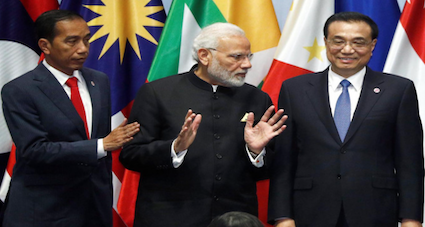India’s long-term strategic goals in the Indo-Pacific region “significantly converge” with those of the ten Southeast Asian nations, Don McLain Gill, a Manila-based foreign policy expert and the Director of South and Southeast Asia at the Philippine-Middle East Studies Association, a think tank, told Sputnik.
Gill said that both the Association of Southeast Asian Nations (ASEAN) and India agree that the region should be “inclusive” and free from “bloc politics”.
ASEAN comprises Brunei, Cambodia, Indonesia, Laos, Malaysia, Myanmar, the Philippines, Singapore, Thailand and Vietnam.
Since last year, ASEAN has established similar Comprehensive Strategic Partnership (CSP) that she signed with India this month: with China, Australia and the US.
“India does not believe that bloc politics is an effective means of advancing national interests,” Gill said, noting that New Delhi has striven to maintain its “strategic autonomy” in foreign relations.
He underlined that New Delhi’s position in the Indo-Pacific rests on keeping ASEAN central to the emerging regional architecture in the Indo-Pacific region, as stated in New Delhi’s Indo-Pacific Oceans Initiative (IPOI) unveiled by Prime Minister Narendra Modi at the East Asia Summit (EAS) in Bangkok in 2019.
The ASEAN Outlook on Indo-Pacific (AOIP) launched in the same year also envisages the centrality of ASEAN and ASEAN-led mechanisms, such as the EAS, in shaping the emerging regional architecture owing to growing strategic competition between US and China.
Gill said that the ASEAN states are wary of taking sides in the “great power competition” between the US and China — a point that they have conveyed on several occasions to both governments.
“India has striven to project that its rise as a global and a regional power will be complemented by a vision that is inclusive without putting in rigid requirements for different states,” he reckoned.
The expert said that there is a “great deal of respect” for India’s position vis-à-vis the Indo-Pacific among the Southeast Asian states, and New Delhi is regarded as a “leading voice” for developing countries in the region.
Gill said that New Delhi has exhibited a “better sense of understanding of diversity prevalent in Asia” than ASEAN’s other CSP partners, such as the US and Australia.
Gill reckoned that the establishment of the India-ASEAN Comprehensive Strategic Partnership and the first-ever Defense Ministers’ dialogue between the two sides this week demonstrates that New Delhi is “fast becoming an increasingly significant partner to the Southeast Asian states.”
The expert noted that India’s rise in the Indo-Pacific and a global power is “dwarfed” by the “material capacity” of US and China.
At the same time, the “structural power shifts” in the global order due to China’s rise, as well as the emergence of other powers, such as India and Japan, provide “greater incentive” to both New Delhi and ASEAN to “cooperate more than before” in the region.
Gill said that there are “stark differences” between the Indian and US’ visions for the Indo-Pacific region.
The US designated India as a ‘Comprehensive Global Strategic Partner’ in 2020 and New Delhi is a member of Washington-led Quad partnership, also comprising Japan and Australia.
“Both are democratic, like-minded partners but we have to understand that the motivation for the US’ Indo-Pacific Strategy is to preserve its status as a resident power in the region,” Gill said.
“India’s vision, on the other hand, represents its rise as a potential regional leader in the Indo-Pacific. So, there are bound to be definite divergences (between India and US),” the Southeast Asian expert noted. Delhi appeared “more accommodating of diverse viewpoints and its vision is more inclusive”, while Washington “seeks to promote its own characteristics” in the region.
Gill further said that although the US has consistently professed commitment to the “centrality” of ASEAN to its Indo-Pacific strategy at various forums, the AUKUS pact unveiled last September “dilutes” Washington’s commitment to the principal.
Indonesia and Malaysia, the two ASEAN heavyweights, have echoed China’s concerns that the US-led plan to help Australia acquire nuclear attack submarines (SSNs) under AUKUS could incite an “arms race” in the region.
Indian Defense Minister Rajnath Singh, speaking at the ASEAN Defense Ministers’ Meeting-Plus (ADMM-Plus) in Phnom Penh this week, struck a similar tone, stating that regional security initiatives should reflect the “larger consensus.”


